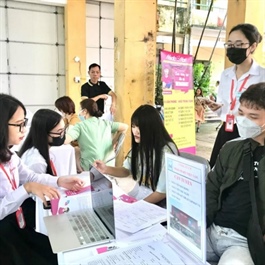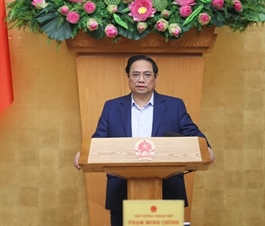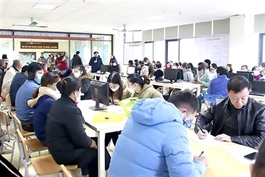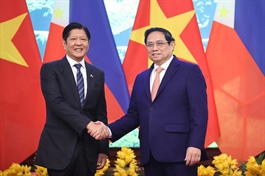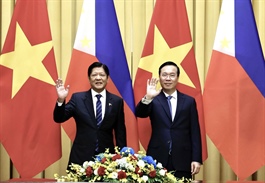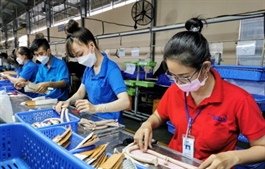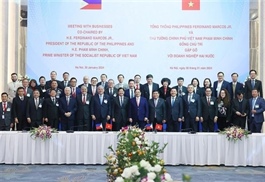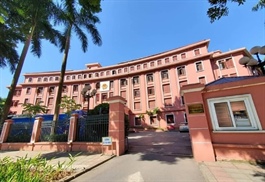Ho Chi Minh City takes a green path
Ho Chi Minh City takes a green path
Ho Chi Minh City is choosing green growth as its future development strategy, seeking funding for almost 30 priority projects to help achieve economic prosperity and environmental sustainability.

The city wishes to promote innovation initiatives and multinational cooperation, calling for private investment to gradually transition to a greener and more sustainable economy, it was announced at a green investment promotion conference organised in coordination with the World Bank last week.
Ho Chi Minh City People’s Committee has issued a list of 28 projects seeking investment to promote green growth. Of those, three high-tech manufacturing projects in electronics and semiconductors require more than $178 million. The city is also calling for funding for a data centre project worth over $300 million.
The metropolis also seeks investment for research and development projects in electronics and semiconductors of about $8.7 million, and supporting industrial production projects with high technology of $14.3 million.
Investment is also wanted for a number of projects in Thu Thiem New Urban Area such as a financial, commercial, and residential area costing $500 million; an exhibition, hotel, and trade complex worth $70 million, and a central square and riverbank park with capital of $220 million.
In addition, there are projects to upgrade and expand major routes such as National Highway 13, National Highway 22, Thu Thiem 4 Bridge, Can Gio Bridge, and Ho Chi Minh City-Moc Bai Expressway.
Ho Chi Minh City is also looking for cash for five projects in wastewater treatment, environmental improvement, and urban embellishment.
The latest research results published by the Institute of Environment and Natural Resources under the Ho Chi Minh City National University have showed that the city releases average annual total greenhouse gas emissions of around 60 million tonnes of CO2, mainly from industrial production, traffic, and living activities. At the same time, the city is also facing the negative effects of climate change, environmental pollution, resource shortages and economic crisis.
At the conference, Chairman of Ho Chi Minh City People’s Committee Phan Van Mai, said, “Along with the general trend around the world, Ho Chi Minh City chooses to give top priority to green growth as its future development strategy to achieve economic prosperity and environmental sustainability. We are moving towards a green and carbon-neutral economy, contributing to the goal of limiting global temperature rises.”
He also added that the city had set a target of reducing emissions by 10 per cent by 2030.
Carolyn Turk, World Bank country director for Vietnam, East Asia, and the Pacific, said the goal could only be achieved through the correct strategies.
“The city needs to motivate the private sector to participate in the green transition process. In many other countries, tax incentives are applied to green businesses, but this can be difficult in some countries, especially developing countries,” Turk said.
“Therefore, the World Bank will accompany Ho Chi Minh City in implementing the economic development strategy to reduce emissions and commit to supporting the city in accessing financial resources and attracting foreign resources to reduce carbon emissions.”
Ho Chi Minh City and the World Bank created a joint working group two years ago and have had some results, such as a $650 million investment package for a 10-year programme, an investment scheme to upgrade public assets, and an integrated flood management scheme.
The World Bank is committed to supporting Ho Chi Minh City in accessing financial resources and attracting foreign resources to reduce carbon emissions. According to Turk, the carbon credit market is a good resource, and she hopes that Ho Chi Minh City can sell credits on the voluntary carbon market.
“Innovations are easy to implement, but the costs are high. If Ho Chi Minh City does it and sells them itself, the transaction costs are high. Therefore, the World Bank wants to help it synthesise all carbon credits, creating a large enough volume for international transactions,” Turk explained.
She added that, due to the small scale, the private sector was having difficulty in accessing the world’s voluntary carbon credit market.
The World Bank has appointed Ho Chi Minh City State Financial Investment Company to be the leading unit to coordinate carbon credits in the city.
Flooding alone causes economic damage to the city that can reach up to $250 million per year, a figure that is likely to continuously increase every year.







